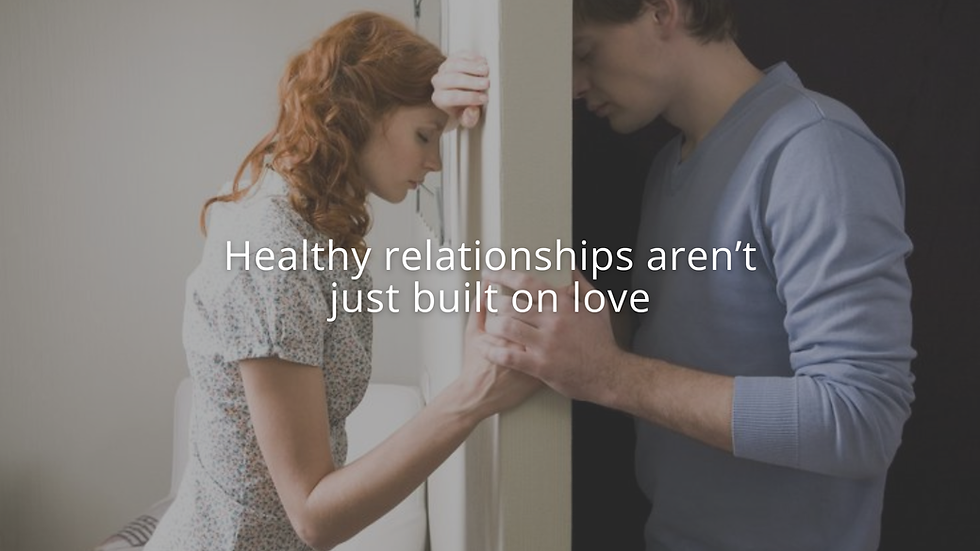Relationship Conflict: How to deal 🙌
- Nov 4, 2022
- 3 min read
Updated: Apr 18, 2025

All relationships, even the most successful ones, have conflict. It is unavoidable. Fortunately, research shows that it’s not the appearance of conflict, but rather how it’s managed that predicts the success or failure of a relationship.
According to The Gottman Institute, there are four key causes of relationship conflict. So let's dive into what they are, how they show up and their antidotes.
Criticism Using words to attack or hurt your partner rather than giving your perspective as to how it affects you and makes you feel.
"You never think about how your behaviour is affecting other people. I don’t believe you are that forgetful, you’re just selfish. You never think of others! You never think of me!”
The antidote: Talk about your feelings and express a positive need. The key here is to voice your perspective without blame using “I statements”. To do this, consider what you feel and what you need?
“I was scared when you were running late and didn’t call me. I thought we had agreed that we would do that for each other.”
Contempt
Attacking a person's sense of self and trying to appear morally superior. Contempt can sometimes include sarcasm, cynicism, name-calling, eye-rolling, sneering, mockery, and hostile humour.
"You forgot to load the dishwasher again? Ugh. You are so incredibly lazy.” (rolls eyes)
The antidote: Be respectful. Remind yourself of your partner's positive qualities and find gratitude for positive actions. If you regularly express appreciation, gratitude, affection, and respect for your partner, you’ll create a positive perspective in your relationship that acts as a buffer for negative feelings. The more positive you feel, the less likely that you’ll feel or express contempt. When it does arise, try responding with a respectful request that ends with a statement of appreciation.
“I understand that you’ve been busy lately, but could you please remember to load the dishwasher when I work late? I’d appreciate it.”
Important to note: Contempt is the single greatest predictor of divorce. Nip it in the bud ASAP!
Defensiveness
Victimising yourself to ward off a perceived attack and reversed the blame
Although it is perfectly understandable to defend yourself if you’re stressed out and feeling attacked, this approach will not work. Defensiveness will only escalate the conflict if the critical spouse does not back down or apologise. Defensiveness is really a way of blaming your partner, and it won’t allow for healthy conflict management.
“It’s not my fault that we’re going to be late. It’s your fault since you always get dressed at the last second.”
The antidote: Take responsibility, accept your partner's perspective and offer an apology for any wrongdoing.
“I don’t like being late, but you’re right. We don’t always have to leave so early. I can be a little more flexible.”
Stonewalling
Withdrawing to avoid conflict and create distance to show you are pissed off!
Stonewalling is when someone completely withdraws from a conflict discussion and no longer responds to their partner.
“Look, we’ve been through this over and over again. I’m tired of reminding you!”
The antidote: Self-soothing - take a break, stop the conflict and individually spend that time doing something soothing that calms you down.
“Honey, I’m sorry to interrupt you, but I’m feeling overwhelmed and I need to take a break. Can you give me twenty minutes and then we can talk?”
Now that you know more about the biggest relationship conflicts and how to counteract them, you’ve got foundations to manage conflict in a healthy way.
But... if you’re still struggling with conflict in your relationship then it’s time you booked in a FREE call to learn more about how my Creating Intimacy Program can HELP YOU!
For less than one fancy date night a week you will get support with:
✅ Handling the pressures that come with managing work stress, kids, testing situations and general fatigue.
✅ Managing differences in priorities and how and why they may need to change.
✅ Overcoming communication roadblocks to communicate better as a couple.
✅ Understanding the difference between intimacy and sex.
✅ Managing differences and expectations.
✅ Supporting each other and managing responsibilities (with a focus on chore wars and money stress.
+ MORE



Comments